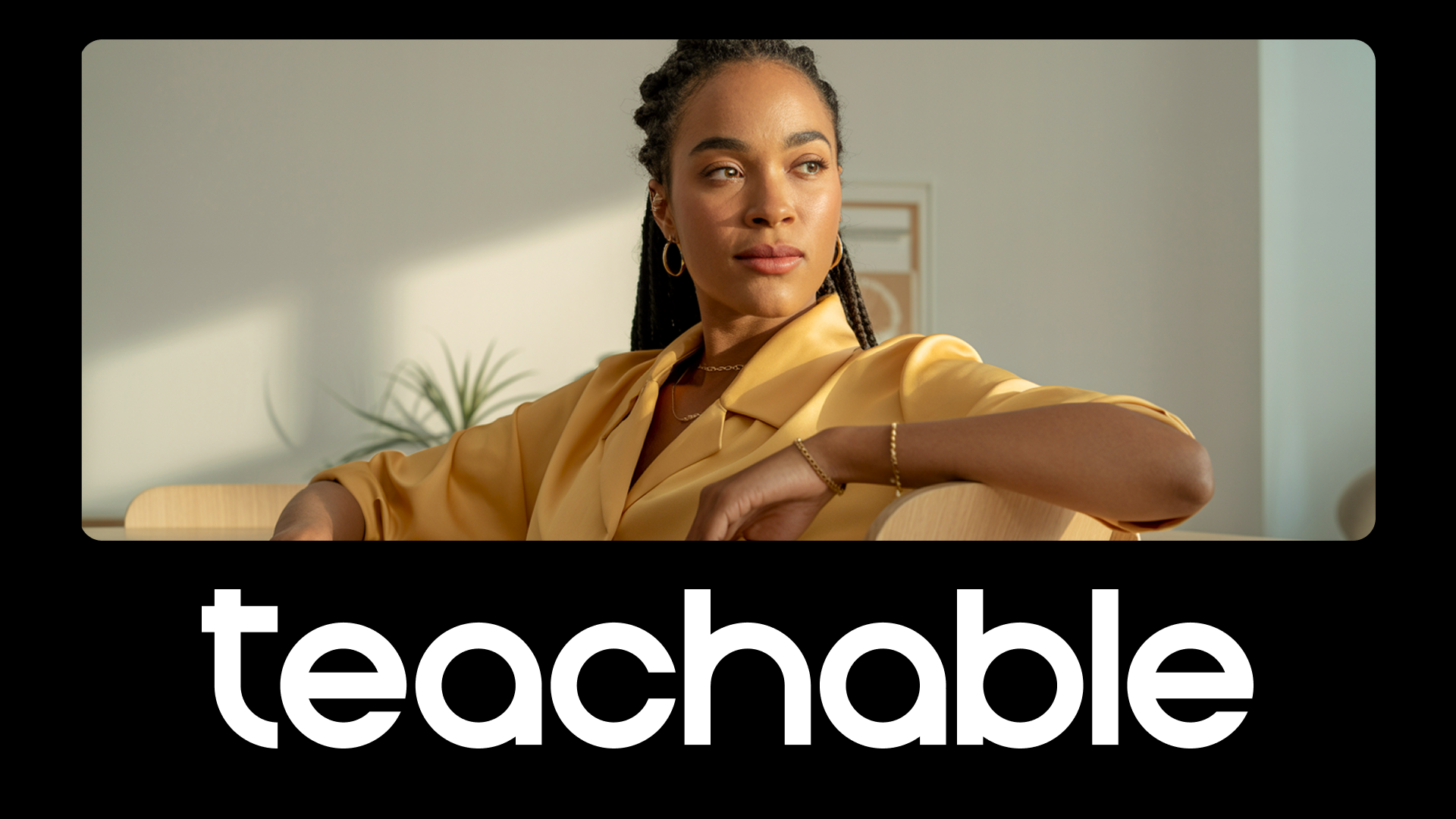Many entrepreneurs and professionals seek out online business coaches because they want personalized advice and guidance. As an online business coach, you can share your expertise and help them grow.
Starting an online coaching business might be easier than you think too, especially if you have previous experience as an entrepreneur. Many entrepreneurs use Teachable to build and sell their coaching services. In this article, we’ll show you how to become an online business coach step-by-step.
What does a business coach do?
Business coaches provide support and guidance to organizations, entrepreneurs, and professionals. Typically, they work with clients to develop personalized, work-focused goals. Then, through coaching sessions, they share actionable advice and build a plan for achieving them.
What you’ll do as a business coach depends on your experience and client goals. One coach might help founders develop their leadership and presentation skills. Another might focus on how to build a growth mindset or overcome imposter syndrome.
In general, business coaches:
- Chart a path for a company’s or individual’s growth
- Motivate teams and act as an accountability partner
- Develop brand vision and values
- Mentor other entrepreneurs
- Identify opportunities to improve performance
- Help you overcome roadblocks that impact your success
Why become an online business coach?
There are many reasons why online business coaching is appealing. Here are some of the biggest benefits to consider.
Earn money online
Business coaching is now a $15.2 billion industry. Many business owners understand the value of a coach and are willing to invest money to grow.
With the right expertise, you can build a successful online coaching business and start earning money quickly. For example, the average salary for a business coach is over $81,000 per year, but experienced business coaches make six figures.
Low startup costs
Becoming an online business coach doesn’t involve a lot of startup or operating costs. Since you host coaching sessions online, there’s no cost for office space. You also don’t need a college degree or certification. But, experience running a business will give you credibility and first-hand knowledge to share with clients.
Work from anywhere
Another perk of becoming an online business coach is that you can work from anywhere. You also have the flexibility to set your own schedule. Some do online business coaching part-time while running their own company or caring for their children. How much time you dedicate to coaching is up to you.
Help clients achieve their goals
Business coaches drive individual and company-wide change. They drive clients toward their goals and work with them to develop the skills and strategies they need to grow.
According to the Institute of Coaching, up to 86% of companies that paid for coaching services recouped their investment and more. As a business coach, you can also make a measurable impact on clients.
How to become an online business coach
Online business coaching is a potentially lucrative and rewarding path. It’s also relatively easy to break into because you don’t need a certification to begin.
If you’re interested in becoming an online business coach, follow these steps to get started.
1. Define your audience and niche
You may have heard this before, but most successful businesses begin with a niche, an area of focus, and a target audience. Your niche should be more specific than “business coaching,” and your audience should be more specific than “business owners and entrepreneurs.”
Business owners often look for coaches that have experience in their industry. They want someone who has been through similar challenges before and will guide them toward solutions.
To find your niche, start with your expertise. What makes you qualified to coach businesses? Are there any problems that you can help entrepreneurs solve?
For example, let’s say you recently left a position with a small book publishing company. You have insider knowledge of the industry and could work with self-publishing entrepreneurs.
If you’ve run e-commerce businesses, you can narrow your niche down to coaching aspiring e-commerce entrepreneurs. You can go even further and identify parts of the business like product, sales, or marketing.
If one industry isn’t standing out, you can focus more on the goal-setting, transformation, and leadership side of business coaching. Highlight the specific skills you have that help entrepreneurs reach their goals.
For instance, Quanisha Green, founder of Black Woman CEO, coaches black women entrepreneurs on building confidence and landing high-paying clients.
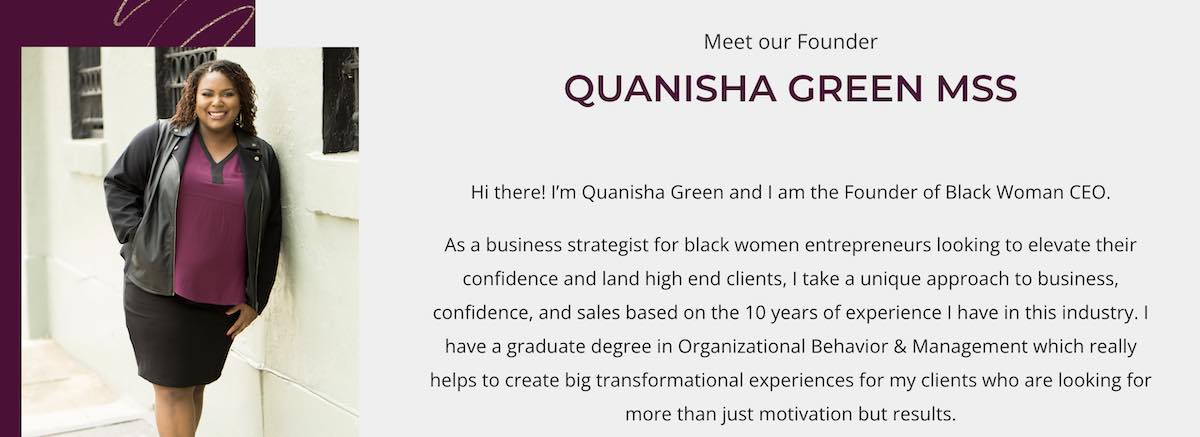
Once you understand your niche, create an audience profile of your ideal client. Be as specific as possible to focus your energy on speaking to your audience.
2. Think about the type of business coach you want to be
There are many types of business coaching. You can specialize in one of these areas:
- Team coaches – work with organizations and teams to work together more efficiently and improve communication.
- Transformational coaches – work with clients to unlock their potential and lead with their unique skills.
- Executive coaches – work with CEOs, COOs, presidents, and other leadership members to optimize performance, manage stress, and more.
- Performance coaches – focus on achieving professional goals. They can work with organizations or individuals and identify opportunities to improve performance.
- Sales or branding coaches – are marketing experts that help companies build a relatable brand that connects with their target audience.
- Leadership coaches – help clients become better leaders. They tend to focus on how to delegate responsibilities, inspire teams, or navigate difficult employee conversations.
3. Plan the structure of your coaching sessions
Planning coaching sessions is similar to building a course curriculum. With a little advance planning, you’ll show clients that you’re credible and care about their experience.
To begin, clearly state your objectives. What do you want clients to gain from your coaching services? Start with common goals and refine them for each client. Then build a loose roadmap of how you’ll get to each goal.
Another approach is to start with a checklist of questions. You’ll build the foundation of your coaching structure with the answers.
Answer questions like:
- How often will you meet with clients?
- Will you coach individuals, groups, or both?
- How long will coaching sessions last?
- Will you work with individuals or companies?
- How will clients schedule sessions?
- What problems will you solve, and how will you solve them?
- How will you get to know your clients and their goals?
- What materials will you or your clients need to prepare for each session?
- How will you track success in coaching clients?
Coaching is highly personal, especially if you host one-on-one sessions with clients. Preparing ahead will build trust with your first coaching clients, but it shouldn’t feel set in stone. As you coach, you’ll learn more about your clients and their goals. Sometimes, those goals may change. Be open to pivoting your coaching sessions when it will improve their experience and outcomes.
4. Set your prices
To price your coaching services, start with the base price—what do you need to earn to cover all your expenses (including taxes) and make a comfortable profit? Then, what is your ideal revenue in the first two to three years? What price do you need to get to your revenue goals? How many hours do you want to work each week?
Compare that with industry standards, but view them as benchmarks. The market prices for coaching services don’t always reflect your years of experience or earning potential.
Most coaches start with an hourly or per-session rate. Some new coaches start at a lower price ($75-$100) and increase their rates as they build a client base. However, people will question the quality if your price is too low, so don’t be afraid of higher rates.
Top-earning business coaches charge upwards of $350 per session and earn over $100,000 per year.
You can also sell coaching packages—a bundle of sessions. The advantage of selling bundles is that it increases your average order value, so for each sale, you earn more. Instead of selling a one-time coaching session for $150, you can sell a package of 10 for $1,500.
Putting a price on what you know can be a challenge when starting an online business. Luckily, Teachable has many resources to help. For example, you’ll avoid common pitfalls by reviewing misconceptions about pricing.
5. Build a professional website and coaching page
Your prospective clients will view your website as a reflection of you. They’ll look at it to form their first impression of you and your business coaching services.
Your website should look professional and reflect your brand, so incorporate branding basics and carry them throughout.
It should also provide all the information potential clients need to make a buying decision, without looking cluttered. At a minimum, include:
- Your bio, qualifications, and background
- The type(s) of coaching you provide
- Individuals and organizations you help
- How you deliver your services (meetings, group classes, guided tutorials)
- How to contact you
- Testimonials
- Call-to-action (what you want visitors to do)
For each service or product you offer, you should have a dedicated landing page, also called a sales page. Founder of Fire Inside Sade Kelly, for example, hosts time management coaching programs.
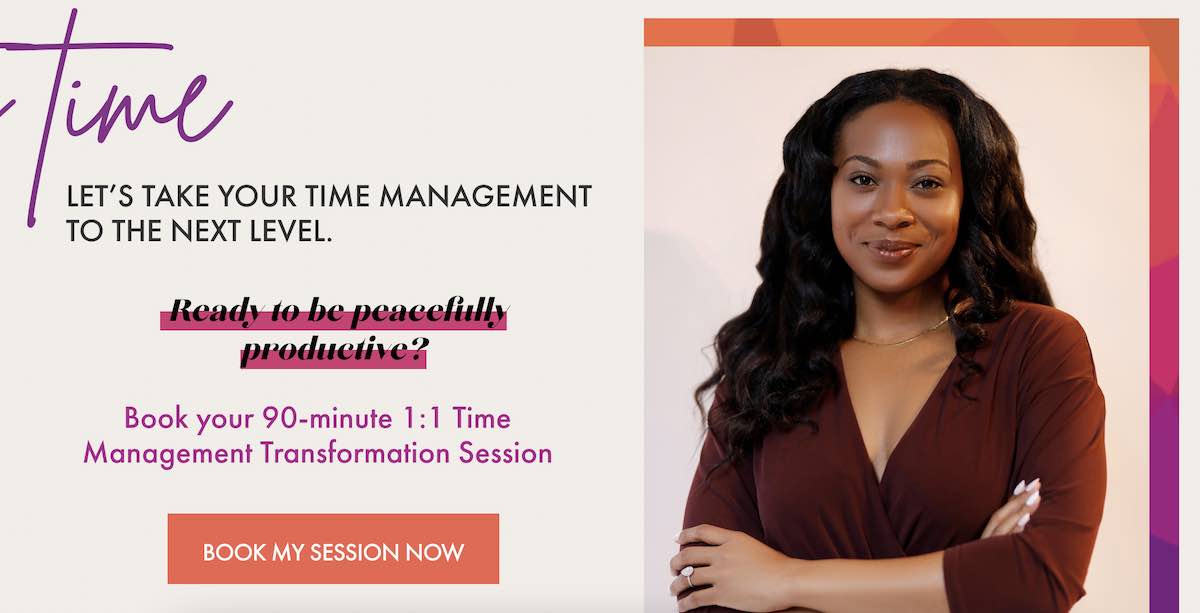
The landing page speaks to the target audience and includes a preview of what you’ll accomplish in the coaching program.
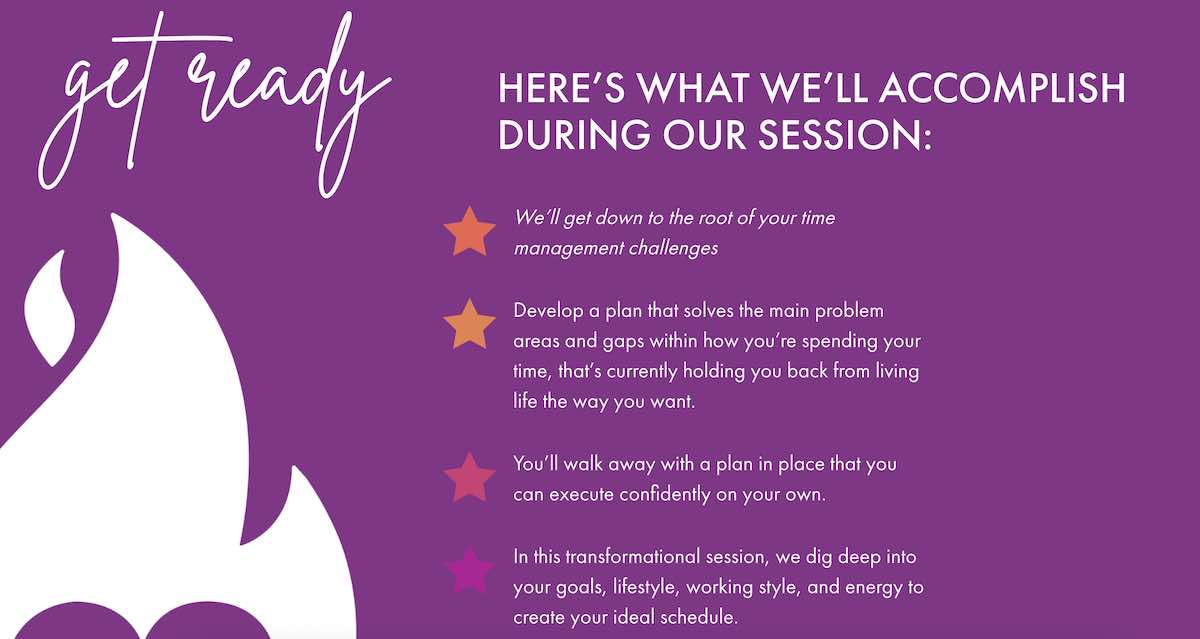
6. Get your first business coaching clients
To launch your online coaching business, you need clients. A well-designed landing page is one piece of the puzzle. However, to get your first coaching clients, you’ll need more.
Here are a few ideas to get coaching clients:
- Network – Research Slack, Instagram, Facebook, Reddit, and other online groups related to your industry. Building your influence in these groups can lead to referrals.
- Get active on social media – For an online business coach, LinkedIn can be an effective tool for sharing content, building relationships, and landing clients.
- Ask for referrals – If you’re working in an industry and already have connections, you can ask your existing network for referrals.
- Provide value (lead magnets) – You can give prospective clients a preview of your value and expertise by offering free content or sample coaching sessions.
Getting your first few coaching clients can be a challenge, but it gets easier once you have them. In many cases, past clients become a main source of growth. They can be your best advocates to vouch for and refer others to your coaching services through word of mouth.
Start your online coaching journey
Teachable makes it easy to start offering your online business coaching services. The code-free platform lets you can build a coaching sales page, schedule sessions, and add other products like online courses and digital downloads. Check out our free or paid plans and launch your online business coaching program today.
FAQs
What qualifications do you need to become a business coach?
You don’t need a degree or certification to become a business coach. Even though you don’t need them, they may be helpful to build credibility.
However, work experience will also go a long way to building trust with coaching clients. No matter what, you’ll need to demonstrate your expertise to your clients, whether with certifications, education, experience, or testimonials.
How much money do business coaches make?
The average income for online business coaching professionals in the United States is over $81,000 per year. The top 25% of earners in this field make more than $120,000 annually.
Remember, many people in this field offer online business coaching in addition to other services. Others work part-time to earn a side income. Either way, you choose how to spend your working hours.
Join more than 150,000 creators who use Teachable to make a real impact and earn a real income.


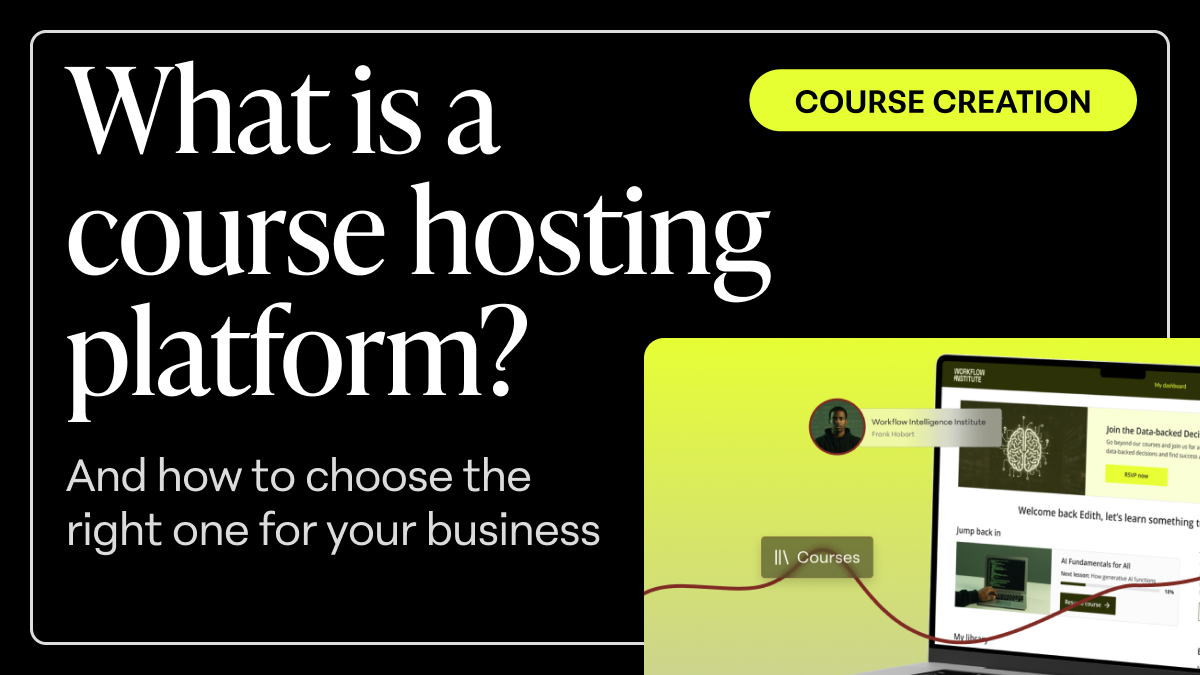

.png)
